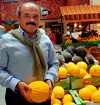Eataly, the slow and experiential supermarket
But I had never written about in those terms. Mea culpa. I was reminded of this gap only when I read the Guinness Storehouse case study on the Design Council website.
The Atlantic Monthly [full article here] calls it the “supermarket of the future”:
“Eataly is an irresistible realization of every food-lover’s gluttonous fantasy, paired with guilt-cleansing social conscience—a new combination of grand food hall, farm stand, continuing- education university, and throbbing urban market. Much like Boqueria, in Barcelona, and Vucciria, in Palermo, two of the few thriving center-city markets left in Europe, Eataly draws all classes and ages at all times of day. The emphasis on local and artisanal producers, education, affordable prices, a lightened environmental footprint, and sheer fun makes Eataly a persuasive model for the supermarket of the future—one that is sure to be widely copied around the world. The question is whether Eataly will bite the hands of the people feeding it, the people it says it wants to help: Slow Food, which is the arbiter and moral center of today’s food culture, and the artisans themselves. “
Monocle carries an excellent video report:
“Housed in a former vermouth factory, Eataly offers the finest artisanal produce from Italian suppliers, all selected with the assistance of Slow Food Italia and accompanied by lovingly compiled details of its provenance and production.”
And also The New York Times featured it, using the opportunity to announce that a smaller version (one tenth the size of the Torino market) will open this spring in a two-level, 10,000-square-foot space in the new Centria building at 18 West 48th Street in New York:
“In January, in what had been a defunct vermouth factory in Turin, [Oscar Farinetti] opened a 30,000-square-foot megastore called Eataly that combines elements of a bustling European open market, a Whole-Foods-style supermarket, a high-end food court and a New Age learning center. […]”
“Artisanal products from some 900 Italian producers fill the store’s shelves, and 12 suppliers (some of which Mr. Farinetti invested in or bought outright) were enlisted as partners. Many of the food items are accompanied by explanatory placards and nearly half of the three-level store is dedicated to educational activities: a computer center, a library, a vermouth museum and rooms for cooking classes and tasting seminars. […]”
“According to management, more than 1.5 million people visited the store in its first six months and sales have exceeded projections.”
In short, for the real experience of fresh products from the Piedmont countryside you need to come to Torino.





[…] some innovative, authenticity-inspired retail concepts (that in some ways are also reflected in the Eataly supermarket in Torino): “17 years ago, Alain Coumont was putting a large communal table in his shop and the people […]
[…] the very successful “slow” and experiential supermarket in Turin, Italy, is now opening branches in Tokyo and New […]
[…] the very successful “slow” and experiential supermarket in Turin, Italy, is now opening branches in Tokyo and […]
[…] il supermercato “slow” ed esperienziale di Torino, sta aprendo ora delle succursali a Tokyo e New […]